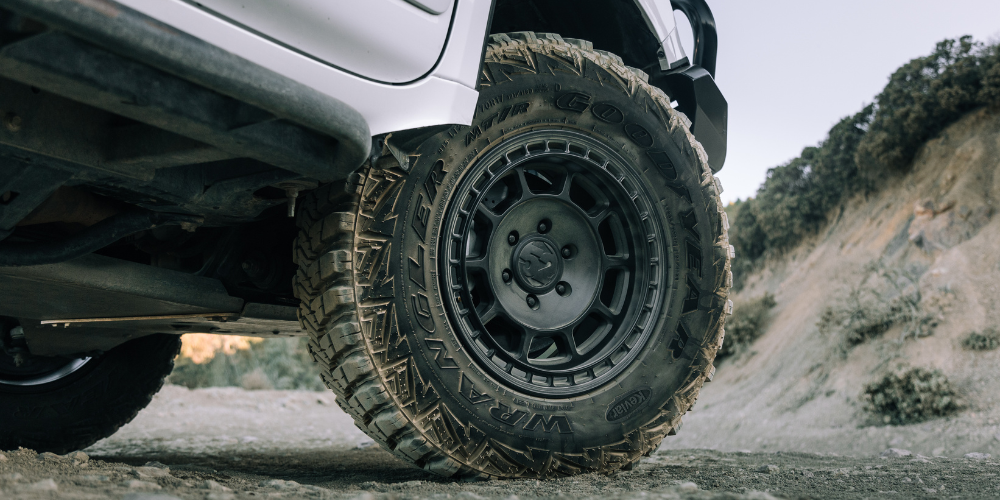First off, what is Wheel Load Rating?
Let's start with the basics. Wheel load rating refers to the maximum weight that a wheel can safely support without risking structural damage or failure. It's typically expressed in pounds or kilograms and is determined by factors such as the wheel's material, design, and construction process.
For street driving enthusiasts prone to tearing up the asphalt, this rating ensures that your wheels can handle the weight of your vehicle along with any additional load from passengers, cargo, or aftermarket modifications. Racecar drivers pushing the limits on the track rely on factoring in wheel load rating to maintain stability and performance under high-speed cornering and braking forces. Off-road enthusiasts navigating rugged terrain need wheels that can withstand the punishment of uneven surfaces, rocks, and obstacles without buckling under pressure, or impacts.
Why is Wheel Load Rating Important?
You might be wondering why you should even care about a wheel’s load rating when there are so many other factors at play; here's why it matters:
Safety First: Your wheels are the foundation of your vehicle's stability and handling. An overloaded wheel can lead to catastrophic failure, compromising your safety and the safety of others on the road or trail. In addition to your own safety, a catastrophic failure can result in some costly repair bills, even if everyone is unscathed.
Performance: Whether you're chasing lap times on the track or conquering off-road obstacles, having the right wheel load rating ensures optimal performance and responsiveness. Overloaded wheels can negatively impact acceleration, braking, and cornering ability, putting a damper on your driving experience. If you’re going to assemble a purpose-built vehicle, it’s better to do it once, and do it right.
Durability and Longevity: High-quality wheels, like the ones you’ll find in the fifteen52 wheels catalog, are engineered to meet or exceed load rating standards, and are built to last. By choosing wheels that can handle the demands of your driving style and environment, you'll minimize the risk of premature wear and damage. This will end up saving you time and money in the long run. Think of quality wheels as an investment, just as much as a purchase.
Compliance and Peace of Mind: Vehicle manufacturers specify recommended load ratings based on the intended use and weight distribution of the vehicle. By adhering to these guidelines and selecting wheels with appropriate load ratings, you can ensure compliance with safety regulations and enjoy peace of mind knowing that your wheels are up to the task.
How to Determine the Right Wheel Load Rating for Your Vehicle
So, how do you know if your wheels are up to snuff? Here's a quick guide to help you find the perfect match:
Consult Your Vehicle's Specifications: Start by checking your vehicle's owner's manual or manufacturer's specifications for recommended wheel load ratings. These guidelines are tailored to your vehicle's weight and performance characteristics, as well as its intended usage, providing a solid foundation for your wheel selection.
Consider Your Driving Habits: Are you a spirited street driver who occasionally hits the track? A dedicated racer pushing the limits at every turn? Or a trail enthusiast tackling rough terrain on the weekends? Tailor your wheel selection to match your driving habits and performance requirements. A higher quality wheel, like those from us here at fifteen52, will be better suited to any incidental impacts.
Factor in Additional Load: Don't forget to account for any additional weight from passengers, cargo, or aftermarket modifications when calculating your vehicle's total load. Choose wheels with a load rating that exceeds this combined weight to ensure continued safety and performance.
Invest in Quality: When it comes to wheels, quality matters. Look for reputable manufacturers known for their commitment to performance, durability, and safety standards. Investing in high-quality wheels with a proven track record is worth every penny.
When it comes to performance of any kind, every detail matters. From horsepower and torque to weight distribution and aerodynamics, it's the sum of these parts that defines the driving experience. So don't overlook the importance of wheel load rating. Whether you're carving corners on the street, chasing podiums on the track, or blazing trails off-road, choosing wheels with the right load rating is the key to unlocking your vehicle's full potential while ensuring a safe and thrilling ride every time. We hope you learned something here today!






